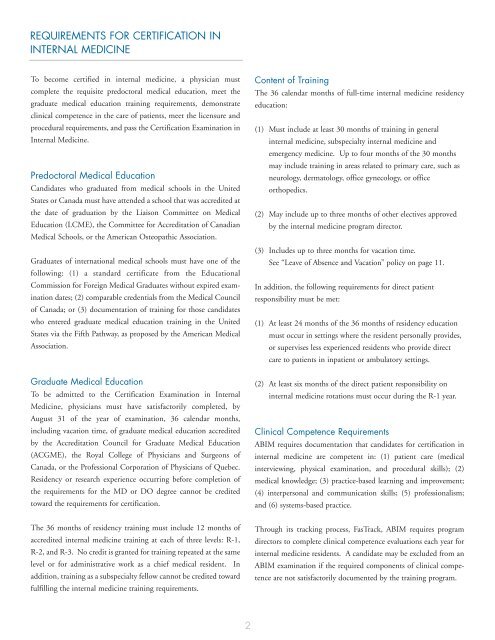Policies and Procedures for Certification - College of Medicine
Policies and Procedures for Certification - College of Medicine
Policies and Procedures for Certification - College of Medicine
- No tags were found...
You also want an ePaper? Increase the reach of your titles
YUMPU automatically turns print PDFs into web optimized ePapers that Google loves.
REQUIREMENTS FOR CERTIFICATION ININTERNAL MEDICINETo become certified in internal medicine, a physician mustcomplete the requisite predoctoral medical education, meet thegraduate medical education training requirements, demonstrateclinical competence in the care <strong>of</strong> patients, meet the licensure <strong>and</strong>procedural requirements, <strong>and</strong> pass the <strong>Certification</strong> Examination inInternal <strong>Medicine</strong>.Predoctoral Medical EducationC<strong>and</strong>idates who graduated from medical schools in the UnitedStates or Canada must have attended a school that was accredited atthe date <strong>of</strong> graduation by the Liaison Committee on MedicalEducation (LCME), the Committee <strong>for</strong> Accreditation <strong>of</strong> CanadianMedical Schools, or the American Osteopathic Association.Graduates <strong>of</strong> international medical schools must have one <strong>of</strong> thefollowing: (1) a st<strong>and</strong>ard certificate from the EducationalCommission <strong>for</strong> Foreign Medical Graduates without expired examinationdates; (2) comparable credentials from the Medical Council<strong>of</strong> Canada; or (3) documentation <strong>of</strong> training <strong>for</strong> those c<strong>and</strong>idateswho entered graduate medical education training in the UnitedStates via the Fifth Pathway, as proposed by the American MedicalAssociation.Content <strong>of</strong> TrainingThe 36 calendar months <strong>of</strong> full-time internal medicine residencyeducation:(1) Must include at least 30 months <strong>of</strong> training in generalinternal medicine, subspecialty internal medicine <strong>and</strong>emergency medicine. Up to four months <strong>of</strong> the 30 monthsmay include training in areas related to primary care, such asneurology, dermatology, <strong>of</strong>fice gynecology, or <strong>of</strong>ficeorthopedics.(2) May include up to three months <strong>of</strong> other electives approvedby the internal medicine program director.(3) Includes up to three months <strong>for</strong> vacation time.See “Leave <strong>of</strong> Absence <strong>and</strong> Vacation” policy on page 11.In addition, the following requirements <strong>for</strong> direct patientresponsibility must be met:(1) At least 24 months <strong>of</strong> the 36 months <strong>of</strong> residency educationmust occur in settings where the resident personally provides,or supervises less experienced residents who provide directcare to patients in inpatient or ambulatory settings.Graduate Medical EducationTo be admitted to the <strong>Certification</strong> Examination in Internal<strong>Medicine</strong>, physicians must have satisfactorily completed, byAugust 31 <strong>of</strong> the year <strong>of</strong> examination, 36 calendar months,including vacation time, <strong>of</strong> graduate medical education accreditedby the Accreditation Council <strong>for</strong> Graduate Medical Education(ACGME), the Royal <strong>College</strong> <strong>of</strong> Physicians <strong>and</strong> Surgeons <strong>of</strong>Canada, or the Pr<strong>of</strong>essional Corporation <strong>of</strong> Physicians <strong>of</strong> Quebec.Residency or research experience occurring be<strong>for</strong>e completion <strong>of</strong>the requirements <strong>for</strong> the MD or DO degree cannot be creditedtoward the requirements <strong>for</strong> certification.(2) At least six months <strong>of</strong> the direct patient responsibility oninternal medicine rotations must occur during the R-1 year.Clinical Competence RequirementsABIM requires documentation that c<strong>and</strong>idates <strong>for</strong> certification ininternal medicine are competent in: (1) patient care (medicalinterviewing, physical examination, <strong>and</strong> procedural skills); (2)medical knowledge; (3) practice-based learning <strong>and</strong> improvement;(4) interpersonal <strong>and</strong> communication skills; (5) pr<strong>of</strong>essionalism;<strong>and</strong> (6) systems-based practice.The 36 months <strong>of</strong> residency training must include 12 months <strong>of</strong>accredited internal medicine training at each <strong>of</strong> three levels: R-1,R-2, <strong>and</strong> R-3. No credit is granted <strong>for</strong> training repeated at the samelevel or <strong>for</strong> administrative work as a chief medical resident. Inaddition, training as a subspecialty fellow cannot be credited towardfulfilling the internal medicine training requirements.Through its tracking process, FasTrack, ABIM requires programdirectors to complete clinical competence evaluations each year <strong>for</strong>internal medicine residents. A c<strong>and</strong>idate may be excluded from anABIM examination if the required components <strong>of</strong> clinical competenceare not satisfactorily documented by the training program.2
















